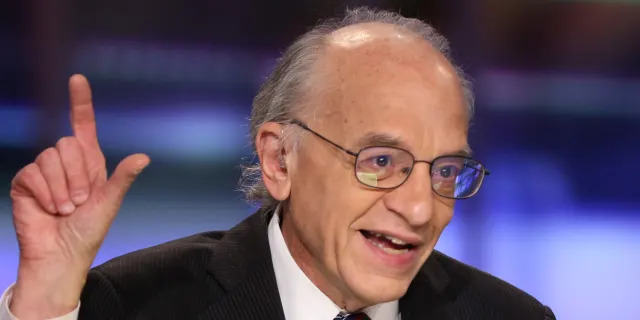. . . "There is a chance we can avoid the worst of a recession — but that requires the Fed to recognize the disinflationary forces I see
US inflation is history, unemployment may spike, and stocks could surge 15% next year, Jeremy Siegel says. Here are the Wharton professor's 12 best quotes from this week.
The inflation threat has passed but unemployment is set to jump, Jeremy Siegel said.
The US economy can still avoid a recession with the Fed's help, the Wharton professor argued.
Siegel suggested the stock market has bottomed already and could jump 15% next year.
The inflation threat has faded, unemployment is set to spike, and the US economy can still escape a recession, Jeremy Siegel said in a flurry of interviews and commentary released this week.
The Wharton finance professor and author of "Stocks for the Long Run" slammed the Federal Reserve for hiking rates too aggressively in response to surging prices. Moreover, he suggested the US stock market has already bottomed, and could surge as much as 15% next year.
Here are Siegel's 12 best quotes this week, broken down by subject and lightly edited for length and clarity:
Inflation
1. "It's negative now, it will be negative next month, and it's actually been negative for the last two months." (Siegel was referring to the core Consumer Price Index, which excludes volatile food and energy prices. He noted it would be negative if it included current instead of backward-looking housing data.)
2. "Inflation is, as I said a month ago, over."
Unemployment
3. "We really could see a rapid softening of of the labor market as they realize that they don't have to hoard labor anymore." (Siegel was arguing that employers hired excess labor during the pandemic because they were worried about worker shortages, but as those fears wane and productivity rises, they might slash headcount.)
4. "Employment has yet to soften notably, but I think the jobs data is likely to deteriorate meaningfully and quickly."
The Fed's interest-rate policy
5. "They're going to be exactly wrong in the opposite direction. They were way too loose before, the funds rate had to rise a lot. And now they're way too tight." (Siegel was warning the Fed has overreacted to inflation and raised interest rates by too much.)
6. "I think the first rate cut might take place closer to mid-year, and it might then be quite rapid as the labor market really does loosen up and inflation goes down. I actually venture that we might see a 2-handle on the Fed funds rate by next December. I think just like the surprise on the upside, we might be seeing a surprise on the downside." (Siegel was suggesting the Fed could lower its benchmark rate from over 4% today to below 3% by the end of next year.)
The outlook for stocks
7. "I think we've seen the low, either in June or October. Even a mild recession would not cause earnings to go down enough to cause a new low in the stock market."
8. "When the Fed gets it — and they will get it next year — I think we've got a good 10%, 15% rally going for the stock market."
9. "People say that this is the most anticipated recession ever. When too many people forecast something, often that drives the market below its fundamental values. A lot of bad news is now factored into prices. The surprises are more likely on the upside than the downside."
10. "I've never seen so much bearishness. That excess of bearishness means this a good opportunity for investors."
The risk of recession
11. "There is a chance we can avoid the worst of a recession — but that requires the Fed to recognize the disinflationary forces I see everywhere."
12. "We're not going to have a strong job market, but we might have stronger GDP and we might have stronger margins, and we may not have a recession." (Siegel was suggesting that fewer but more productive workers could buttress economic growth and corporate profit margins against inflation, helping the US to avoid a recession.)
Read the original article on Business Insider
RELATED CONTENT..
The DJIA opened up 600 points, off premarket highs. Among big media stocks, Disney is up 1.57%; Warner Bros. Discovery up 4.5%.; Comcast up 3%.
The Consumer Price Index, or CPI, rose 7.1% in November from the year before and was up 0.1% from October, according to monthly data released today by the Bureau of Labor Statistics.
Expectations were for a higher 7.3% year-on-year rise, and in line with the 0.1% monthly increase.
Stripping out volatile food and energy prices, what’s called “core” inflation rose 6% year on year and 0.2% month over month in November vs. expectations of 6.1% and 0.3% increase.
Joe Biden Says “Things Are Getting Better” With Inflation As Rate Slows In November — Update
UPDATE: President Joe Biden seized on the news of a slowing rate of inflation in November to make the case that it is a reason for optimism.
“Make no mistake: prices are still too high,” Biden said from the White House, where he was flanked by his economic advisers. “We have a lot more work to do. But things are getting better, headed in the right direction.”
More from Deadline





No comments:
Post a Comment